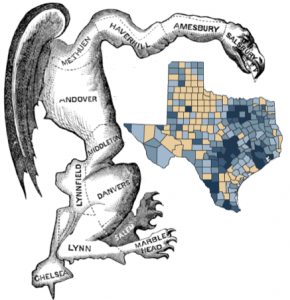Texas Redistricting Case Is In The Hands of 3 Federal Judges
 All of the arguments in the federal law suit against the State of Texas’ redistricting scheme have been made. The Plaintiffs – The Mexican American Legislative Caucus (MALC); LULAC; MALDEF – have rested their case. It’s now up to the State to present it’s final arguments and then the panel of judges will decide. The case boiled down to this, as expressed in a MALC newsletter:
All of the arguments in the federal law suit against the State of Texas’ redistricting scheme have been made. The Plaintiffs – The Mexican American Legislative Caucus (MALC); LULAC; MALDEF – have rested their case. It’s now up to the State to present it’s final arguments and then the panel of judges will decide. The case boiled down to this, as expressed in a MALC newsletter:
Texas gained four new congressional seats due to the unprecedented population growth of minorities and the State has failed to adequately represent that growth in the new maps.
This may be the hardest part of the process, the waiting.
All of the research, the arguments, and the presentation of evidence, data and expert witnesses comes to this: how will the judges rule?
I know this crowd, this bunch of lawyers and activists. They’re not the type to sit and wring their hands. But they love to speculate and given free time, that’s what they’ll do. So let’s indulge the speculation – who are these judges that hold the immediate future of Latino politics in their hands?
It’s a panel of three federal judges: District Judge Orlando Garcia, District Judge Xavier Rodriguez and Circuit Judge Jerry Smith. If you’re keeping score and you think it matters, that’s two Latinos and one white non-Latino (to use the Census parlance).
- Garcia is 59 years old, he graduated from UT Austin and studied law there as well. He served in the Texas House of Representatives for about 8 years and on the Fourth Texas Court of Appeals for one year before being nominated to the federal bench by President Clinton 1993. He was confirmed in 1994.
- Rodriguez is 49 years old, studied at Harvard and went to law school at UT Austin. He’s got a masters in public administration from that same university. He practiced law at Fulbright & Jaworski unitl 2001, when Gov. Rick Perry appointed him Justice of the Texas Supreme Court. He lost the Republican primary, but then President George W. Bush appointed him to the federal bench in 2003.
- Smith is the eldest of the judges. He’s 65 years old, and got his BA and JD at Yale. He served as the Houston City Attorney and was nominated to the federal court of appeals by Ronald Reagan in 1987. He authored the majority opinion in Hopwood v. Texas, the case that struck down the University of Texas’ affirmative action program.
What can we make of this? As much or as little as you want.
Going in to the trial the panel was seen as friendly to the plaintiffs cause – the 2 out of 3 Latino majority had the plaintiffs feeling good about their chances. The irrefutable evidence, they thought,was on their side as well. The San Antonio Express-News reported:
…Dr. John Alford, a political science professor at Rice University — also said the redistricting map passed by the Legislature would keep the number of minority opportunity congressional districts the same, contradicting the state’s longstanding assertion that the map would create an additional seat.
In the afternoon after the plaintiffs presented their final arguments I met with one of the political activists who had been present throughout the weeks-long proceedings. He felt optimistic. Even judge Smith, he said, had asked questions during the trial that led him to believe that there may be a unanimous decision against the state’s new electoral districts. But who knows, he shrugged.
That’s about where we are. Who knows? We should find out soon.
[Image Created By Census And Elkanah Tisdale]

